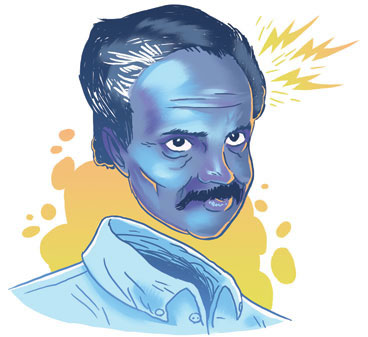This course examines the major fields of psychology, from a research perspective, with the aim both to illuminate the experimental methods used to examine psychological phenomena, and the advantags of triangulation of diferent research methods.

|
1. Introduction to Experimental Psychology
Homework:
Chapters 1 in course textbook (Gazzaniga et al. 2012, Psychological Science).
Epstein: Philosophy of Science
Further reading:
An Introduction to Philosophy of Science Malcolm Forster
|

|
2. Research Methododologies and Ethics
Homework:
Chapter 2 in the textbook
Introduction to Research Methods and Experimental Design,
Further reading:
Karl Popper
American Psychological Association (APA) Ethical Principlies and Code of Conduct.
British Psychological Society: Ethical Guidelines
Qualitative vs. Quantitative Research,
Experimental Design and Paper Write Up
|

|
3. Genetics and Evolution
Homework:
Leda Cosmides & John Tooby: Evolutionary Psychology: A Primer (1997)
Jaak Panskepp and Jules Panskepp: The Seven Sins of Evolutionary Psychology (2000).
Confer, Easton, Fleischman, Goetz, Lewis, Perilloux and Buss (2010) Evolutionary Psychology Controversies, Questions, Prospects, and Limitations
Further reading:
William Dickens and James Flynn: Heritability Estimates vs. Large Environmental Effects: The IQ Paradox Resolved (2001).
Ned Block: How Heritability Misleads about Race (1996).
Charles Darwin: The Voyage of the Beagle and The Origin of Species. Robert Young: Science and the Humanities in the Understanding of Human Nature (2000).
Summary of Steven J. Gould's Mismeasure of Man,
University of Plymouth: Evolutionary Psychology Resources
Evolution: Why Sex?
|

|
4. The Brain and Nervous System
Homework:
Chapter 3 in textbook.
Solms and Turnbull: The Brain and the Inner World chapter 1
Chapter 2, 3, 4, 5, 6, 9
S. Jones: Reading the Record
|
 |
Ramachandran: Secrets of The Mind. The Emerging Mind (5 lectures) |

|
5. Animal and Comparative Psychology
Gregory Caray: Introduction to Evolutionary Psychology,
One of the following: Harry Harlow: Love in Infant Monkeys (1959). James Olds: Pleasure Centre's in the Brain. Joseph Brady: Ulcer's in 'Executive' Monkeys (1958). Burrhus Fredric Skinner: 'Superstition' in the Pigeon (1947). Harry Harlow: The Nature of Love (1958).. University of Plymouth, Psychology Learning Materials: Coping with Stress. |
 |
6. Sensation and Perception
Our Sense of Touch, Psychological Science Animations and Videos, Laura Chivers: Blindsight and Consciousness (2002). Visual Illusions, Michael Bach: Optical Illusions & Visual Phenomena including 'equiluminance'. Psychophysics, Sensation and Perception Tutorials, Sensation and Perception, Gestalt Principles of Perception, Rorschach Tests. Thematic Apperception Test, Henry Murray: Individual Differences: Thematic Apperception Test MANUAL.Projective Tests. Walter J. Freeman: The Physiology of Perception (1991), Freud lecture, A. E. Kazdin: Subliminal Perception (2000). Barry Arons: A Review of The Cocktail Party Effect, Aldous Huxley: The Doors of Perception (1954). |
 |
7. Learning and Reward
Learning Theories Map and Website, John Watson's online papers,Operant Conditioning and Behaviorism, GAME: Pavlov's Dog Game, Little Albert Experiment, Behavior Therapy, APA: Behaviorism: the rise and fall of a discipline (1999), Behaviourism. John B. Watson and Rosalie Rayner: Conditioned Emotional Reactions (1920), Skinner: 'Superstition' in the Pigeon (1947). Radical Behaviourism, Albert Bandura, Observational Learning, Wolfgang Koehler: Gestalt Psychology Today (1959). APA: Childhood Exposure to Media Violence Predicts Young Adult Aggressice Behaviour, According to a New 15 Year Study (2003). Eric Kandel, LTP, Synaptic Plasticity, Neuroplasticity, Self Organization, Emergence, Complexity. Swarm Intelligence, Kandel Papers, Kandel Research Lab, Habituation, Mirror Neuron, Sensitization. Cell and Molecular Biology Studies of Memory Storage (Kandel), VIDEOS: Stress and Memory, Cyborg Insects. Brain-Controlled Rat and Monkey.
|
 |
8. Memory
Anosognosia reading
Short-Term Memory Test (letters) and pictures, Joanna Schaffhausen: The Day His World Stood Still (Brain Connection, 2006). Scoville & Milner: Loss of recent memory after bilateral hippocampal lesions. Journal of Neurology, Neurosurgery and Psychiatry, 20, (1957). Corkin, S: What's new with the amnesic patient H.M.? Nature Reviews Neuroscience, 3(2), 153-60 (2002), Human Memory. Brain and Behaviour: Learning, Memory and Amnesia, Prof. Jerome Liss, M.D: Psychoanalysis and Neurophysiology. Davis: Freud's Screen Memory, Duke University: How Brain Gives Special Resonance To Emotional Memories (Science Daily, 2004). Peggy Rice: Gendered readings of a traditional "feminist" folktale by sixth-grade boys and girls (Journal of Literacy Research, 2000). Dosher et al: Fast decay of iconic memory in observers with mild cognitive impairments (2005, PNAS, vol. 102, no. 5, 1797-1802). Robert Baron: Pilots and Memory: A Study of a Fallible Human System, Levels of Processing (F. Craik and R. Lockhart). Elizabeth Johnston: Infantile Amnesia (1997), Mauro Mancia: Implicit memory and early unrepressed unconscious (2006). Levels of Processing Test, Ben Best: Learning, Memory and Plasticity.
VIDEOS: Ramachandran: Splitting, Denial, Narcissism and Anosognosia- Neuropsychoanalytic Perspectives on the Right Hemisphere. Clive Wearing: Life Without Memory, Oliver Sacks: Amnesia and Music and Alzheimer's and the Power of Music.
|
 |
9. Consciousness and Free Will
William James Papers: Does 'Consciousness' Exist? (1904), The Stream of Consciousness (1892).
Libet's Brain Experiments, Consciousness and Free Will, Libet's Short Delay, Daniel Dennet: Freedom Evolves (2003). Antonio Damasio: The Feeling of What Happens (2000), Paul Newall: An Introduction to the Philisophy of Mind (2005). VIDEO: Split-Brain Experiments with Gazzaniga, The Mind-Body Debate. The Philosophy of Mind and the Mind-Body Problem. Dennis Overbye: Free Will: Now You Have It, Now You Don’t (New York Times, Jan 2007), Dennett on Consciousness. Solms & Turnbull: Mind and Brain
|
 |
10. Cognition and Language Development
Prospect Theory, The Suggestibility of Children, Gerd Gigerenzer and Daniel G. Goldstein: Models of Bounded Rationality (1996). Trina C. Kershaw: Key Actions in Insight Problems: Further Evidence for
the Importance of Non-Dot Turns in the Nine-Dot Problem (2006). Phillippe Mongin: Expected Utility Theory (1997), Peter Hepper: Unravelling our beginnings: the embryonic science of fetal psychology (2005). Amir Khella: Knowledge and Mental Models in Human-Computer Interaction (2002),Ann Arbor: Memory Starts To Decline In Our Mid-20s (2001). Karen Kersting: Measuring cognitive decline: Tests that measure age-related cognitive decline may not be completely accurate (2003). Heuristics, Garde et al: Decline in intelligence is associated with progression in white matter hyperintensity volume (2004). Douchemane & Fontaine: Can Fluid Intelligence Decline with Aging be explained by Complexity? (2003). Robert R. Provine: Laughter: A Scientific Investigation (2001), Donald Winnicott: Playing and Reality (2005). Margaret Snowling: Language Skills and Learning to Read (2004), Nim Chimpsky, Animal Language, Sign Language Studies. Famous Monkeys, Animal Communication, A Broken heart, Laura Petitoto: Impish chimp changed science (2000), Genie. Freud Guides: Jokes and Their Relation to the Unconscious. S. Herron: Bewilderment and Suspension Bridges: The Joke as Symptom of Language (2006). Lacan and Language. Lecture: Stephen Pinker: The Stuff of Thought (and interview) |
 |
11. Emotion and Motivation
Leda Cosmides & John Tooby: Evolutionary Psychology and the Emotions (2000). Daniel J. Burdick: The Neurobiology of Fear: Emotional Memory and Post-Traumatic Stress Disorder (2001). Duke University: How Brain Gives Special Resonance To Emotional Memories (Science Daily, 2004). Motivation, homeostasis, W. Huitt: Motivation to learn: An overview. Educational Psychology Interactive (2001). Deirdre Scully and Ruth Lowry: Why we do – And why we don't! On ‘participation motivation’ in sport and exercise (2002). Ruiz & Cid: Interactive Effect of Self-Efficacy and Incentive Value on Peripheral Physiological Reactivity in The Performance of a Cognitive Task (1997). Hans-Joachim Kornadt: Social Motives and their Develipment in Cultural Context (2002), Albert Bandura: Self-Efficacy Defined (1998). Holsen et al: Abnormal Food Motivation in Prader-Willi Syndrome: Relationship between Neural Dysfunction and Obesity using fMRI. Circadian Rhythms
Solms: on Korsakoff's, depression and addtion (The Feeling Brain) |
 |
12. Sleep and Dreams
Solms and Turnbull: on dreams. Gray, Braver & Raichle: Integration of emotion and cognition in the lateral prefrontal cortex (2002), International Neuro-Psychoanlysis Society. Mark Solms: The Interpretation of Dreams and the Neurosciences. Mark Solms: Dreaming and REM Sleep are Controlled by Different Brain Mechanisms, Behavioral and Brain Sciences 23 (6) (2000). Sigmund Freud: The Interpretation of Dreams (1900). Freud Guides: The Interpretation of Dreams. Mark Solms: Freud Returns...(Hobson: ...Like a Bad Dream). William Domhoff: The Problems with Activation-Synthesis Theory (2006). Evolutionary Neurobehaviour Lab, Boston University School of Medicine: 1. Encorporation of Episodic Memory Fragments into Dreams. 2. Encorporation of Emotion into Dreams, 3. REM and NREMDifferences in Simulation of Social Interactions. 4. REM and NREM Differences and Interactions in Production of Emotional Content, Jolanda Jetten: Sleep on a Problem, It Works Like a Dream (The Psychologist, March 2006). Prague Neuropsychoanalysis Group: Videos and Articles |
 |
14. Information for the Final Exam
The final exam will be a choice of essay questions. You will choose any two of the final three topics covered and write two essays on these topics. Write approximately 1.5-2 pages per essay. The topics are:
i) Memory and the mind: describe research into the psychology and neuroscience of memory, and describe what we can learn about normal memory from studying memory disorders (both neurological and psychological)
ii) Emotions are central to our psychological lives. How has affective neuroscience increased our understanding of emotion and motivation in the mammalian brain? In your answer discuss Jaak Panksepp’s ‘basic emotion systems’ and other research on emotions.
iii) ‘Dreams are froth’? Discuss this with reference to experimental studies on sleep and dreaming and the controversy between Hobson and McCarley’s ‘activation-synthesis model’ and Mark Solms’ neuropsychoanalytic model of dreams, and what lessons this provides for experimental psychology.
Good Luck! |












